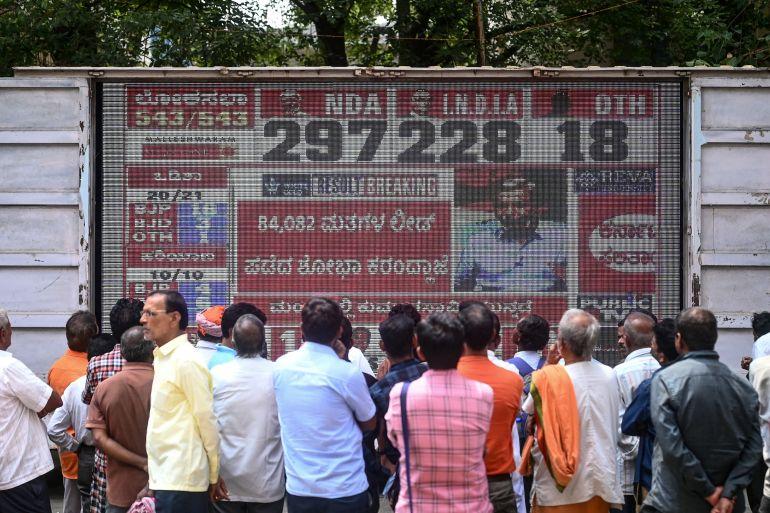Source: ALJAZEERA
ALJAZEERA MEDIA NETWORK

India's stock indexes experienced a significant drop, the largest since March 2020, driven by uncertainties over Prime Minister Narendra Modi's ability to secure a majority in the elections.
Indian stocks have experienced their steepest intraday decline since March 2020, with foreign investors recording unprecedented selling levels as election trends indicated Prime Minister Narendra Modi's coalition was unlikely to achieve the majority forecasted by exit polls.
With over half of the votes tallied, the Bharatiya Janata Party (BJP), led by Modi, seemed unlikely to secure an independent majority in the 543-member lower house of parliament, likely necessitating alliances within the National Democratic Alliance (NDA) for government formation.
This development brings potential uncertainty to economic policies, including those aimed at investment-driven growth that have been central to Modi's administration. The Indian economy saw an 8.2 percent growth in the financial year that ended in March 2024.
"The critical query is whether the BJP can maintain a single-party majority," remarked Ken Peng, Asia investment strategy head at Citi Global Wealth. "If not, will the coalition sustain its economic growth drive, especially in infrastructure?"
The NSE Nifty 50 index closed 5.93 percent lower at 21,884.5 points, while the S&P BSE Sensex dropped 5.74 percent to 72,079.05. Earlier in the day, both indices plunged by as much as 8.5 percent, after reaching record highs on Monday.
At their nadir, the indices marked their biggest intraday plummet since March 2020, coinciding with the initial COVID-19 lockdown.
"Given dependency on coalition partners, the upcoming NDA government might shift towards a welfare-centric agenda rather than reforms during the July budget," said Puneet Sharma, CEO and fund manager at Whitespace Alpha.
Analysts at Emkay Global predict a market derating in light of heightened risk perceptions, suggesting that challenging reforms concerning land, labor policies, and state enterprise privatisation are "off the table".
Exit polls over the weekend predicted a substantial victory for Modi's NDA, pushing markets to new highs on Monday as investors were hopeful for ongoing economic growth.
Until Monday's close, the benchmark indices had surged more than threefold since Modi's ascension to the prime minister role in May 2014.
Foreign investors, who had injected a net $20.7 billion into Indian equities the previous year but retracted before the election, were anticipated to resume buying if Modi's coalition secured a decisive victory.
On Tuesday, foreign institutional investors (FIIs) offloaded a record 124.36 billion rupees (about $1.5 billion) worth of Indian stocks, according to provisional data released later that evening. They had acquired a net 68.51 billion rupees ($824.4 million) in shares on Monday.
"From our perspective, the NDA's return signifies policy continuity," commented Mike Sell, Alquity's head of global emerging market equities in London. "The win's margin, whether narrow or wide, affects the extent of structural reform but ultimately, a win maintains the positive outlook for India's growth narrative."
The unclear margin of victory for the NDA led to heightened intraday volatility, reaching its peak in 26 months. High-frequency trading exacerbated the decline, triggering margin calls.
The market's drastic correction was attributed to margin calls, as retail investors held heavily leveraged positions noted Rupak De, senior technical analyst at LKP Securities.
Some investors viewed the downturn as a buying opportunity.
"Regardless of the final electoral results, India's economy stands to benefit from long-term demographic advantages and ongoing geopolitical tensions between China and the U.S.," stated Gary Tan, portfolio manager at Allspring Global Investments.
Investors anticipate the Modi government will persist in aiming to transform India into a manufacturing hub, attracting foreign entities like Apple and Tesla looking to diversify beyond China.
The rupee closed at 83.53 against the U.S. dollar, a 0.5 percent drop for the day, marking its worst single-day fall in 16 months. The benchmark 10-year bond yield climbed 10 basis points, its largest single-day rise in eight months, to end at 7.03 percent.
Your email address will not be published. Required fields are marked *